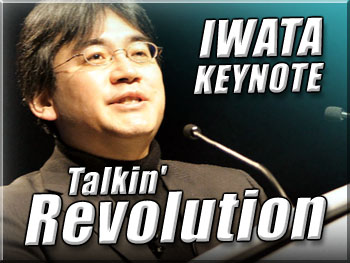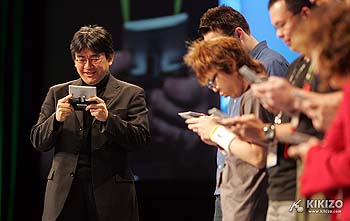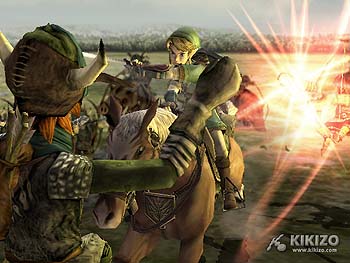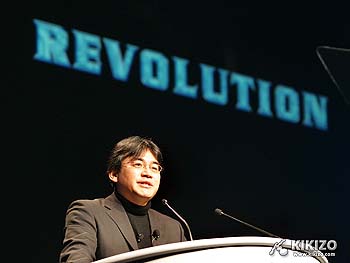Iwata Ushers in Revolution
Nintendo's top man takes to the stage at GDC to discuss Revolution, Zelda, DS and where Nintendo is going.
Nintendo finds itself in a precarious position these days. The company that many have come to equate with videogames over the last two decades has been losing roughly half its market share with each new generation of hardware. At the Game Developers Conference, running this week in San Francisco, Nintendo president Satoru Iwata gave attendees a glimpse at the ideas that form the foundation of his company's path going ahead.
 Iwata has had a long affair with the industry, as a gamer,
Iwata has had a long affair with the industry, as a gamer,a designer and an executive
During an impassioned speech titled "The Heart of a Gamer" Iwata, who started out as a programmer at Nintendo's HAL Laboratories, challenged the audience by reiterating several of the concepts Nintendo has become well known for over the past year.
Iwata criticized the trend among game creators to favour flashy visuals over innovative gameplay ideas. "Someday our games won't look any better. What will we do then?" asked Iwata. It's a valid point. With increasing hardware power and the leap into the next generation upon us, the time is at hand where games will have peaked visually.
"Making games photorealistic is not the only way of improving the experience. This is just one path to improved games. We need to find others. 'Improvement' has more than one definition."
Iwata also bemoaned the obsession with catering only to those in the know. He asked what was being done to bring in the millions of people who don't play games. As an example of what Nintendo is trying to do, Iwata spoke of the Nintendo DS. The handheld, which recently crossed the 4 million sales mark, incorporates the core principles of Nintendo's design philosophy by supplying innovative hardware and a fine-tuned and user-friendly interface.
 Iwata welcomed Nintendo's Bill Trinen and six audience
Iwata welcomed Nintendo's Bill Trinen and six audiencemembers on stage for an impromptu 8-way session
of Mario Kart DS
During the presentation, Iwata also showed off two of Nintendo's new DS "non-game games": Nintendogs and Electroplankton. These have been devised with more casual gamers and non-gamers in mind.
Nintendogs is basically the next evolution of the virtual pet. Using the full complement of features of the DS, including the touch-screen, the microphone and the traditional button and pad inputs, you look after a little critter all your own. The game is already on sale in Japan and is proving a hit, though there's no definite data on how many people buying it are actually new gamers.
The second title shown off, Electroplankton, falls outside of what's traditionally considered to be a video game. With its haunting visuals of undersea plankton and calming sounds, it's a world away from the guns and blood that represent games these days. According to Iwata, " the game was designed to produce harmony - not adrenaline".

 Animal Crossing DS will be one of Nintendo's first DS
Animal Crossing DS will be one of Nintendo's first DSgames to fully support WiFi
Another feature of the DS was also touted at the event was its WiFi network connection. While location-based multiplayer is already a reality, Nintendo will soon make the jump to multiplayer over the Internet. Nintendo's standardbearer for this new feature is another "non-game game" - Animal Crossing.
The previous GameCube version of Animal Crossing allowed players to visit each other's villages and swap items using combinations of memory cards and codes. With the DS version of Animal Crossing, everything will be taken online.
And yet, despite the inherent problems associated with technology such as WiFi, Nintendo's is standing by its mantra of keeping things simple for gamers. DS WiFi access will be kept as non-technical as possible for gamers so that it just works.
Nintendo is also not losing focus on catering to its existing fans though, as exemplified by the effort being put into the new Legend of Zelda game for GameCube. During the presentation, Iwata showed off a brand new trailer for the game (which you can watch right here). Legend of Zelda is not expected in stores until later this year, but the game will be one of the major attraction at E3 in May.
But the highlight of the talk was the announcement of first details for Nintendo's GameCube successor, codenamed Revolution. Despite what many had feared, given Iwata's statements regarding overemphasis of graphics, the Revolution will provide a truly next-generation level of graphics and sound.
Nintendo has teamed up with IBM to create the new processor for Revolution, codenamed Broadway - "because Broadway is the capital of live entertainment". Graphics chip creator ATi has again been called upon by Nintendo to create the visual heart of Revolution, which is codenamed Hollywood - "because Hollywood is the capital of movie entertainment".
Revolution will also include backwards compatibility, which will allow it to play GameCube games. This is the first time a Nintendo home videogame system will be able to play games from the previous generation. Many feel that a large part of the reason for Sony's early success with the PlayStation 2, when there was still little in the way of high quality hardware, was because the console was able to play PlayStation games, some even with subtle enhancements.
The most interesting hardware feature of Revolution though is the inclusion of integrated WiFi access. This will likely serve multiple purposes. In addition to the obvious one of granting Internet access wirelessly, it will also probably be used for connecting to the WiFi-enabled DS and possibly also the new revision of the Game Boy Advance alluded to by analysts in February.
The sudden support for online play marks a departure for Nintendo, which until recently has slated the technology as something not worth spending much attention on and without any foreseeable financial rewards. The GameCube, for example, despite supporting a network adapter for both dial-up and broadband Internet access, only has a handful of games playable online. With Xbox Live leading the way in the online console sphere with nearly 2 million users, Nintendo seems to have had a change of heart.
What Nintendo is trying to do with video game is markedly different from what Sony and Microsoft have in mind. Iwata has stated before that not everyone will agree with what they are going to do with Revolution. More details about the console will be revealed at E3, but the big question right now is whether gamers and non-gamers alike will be interested in what Nintendo has to offer.
Alex Wollenschlaeger
Editor, Kikizo Games








 Satoru Iwata Video Interview - the late Nintendo president spoke with Kikizo in 2004 as 'Nintendo Revolution' loomed.
Satoru Iwata Video Interview - the late Nintendo president spoke with Kikizo in 2004 as 'Nintendo Revolution' loomed. Kaz Hirai Video Interview - the first of Kikizo's interviews with the man who went on to become global head of Sony.
Kaz Hirai Video Interview - the first of Kikizo's interviews with the man who went on to become global head of Sony. Ed Fries Video Interview - one of Xbox's founders discusses an epic journey from Excel to Xbox.
Ed Fries Video Interview - one of Xbox's founders discusses an epic journey from Excel to Xbox. Yu Suzuki, the Kikizo Interview - we spend time with one of gaming's most revered creators.
Yu Suzuki, the Kikizo Interview - we spend time with one of gaming's most revered creators. Tetris - The Making of an Icon: Alexey Pajitnov and Henk Rogers reveal the fascinating story behind Tetris
Tetris - The Making of an Icon: Alexey Pajitnov and Henk Rogers reveal the fascinating story behind Tetris Rare founders, Chris and Tim Stamper - their only interview? Genuinely 'rare' sit down with founders of the legendary studio.
Rare founders, Chris and Tim Stamper - their only interview? Genuinely 'rare' sit down with founders of the legendary studio. The History of First-Person Shooters - a retrospective, from Maze War to Modern Warfare
The History of First-Person Shooters - a retrospective, from Maze War to Modern Warfare